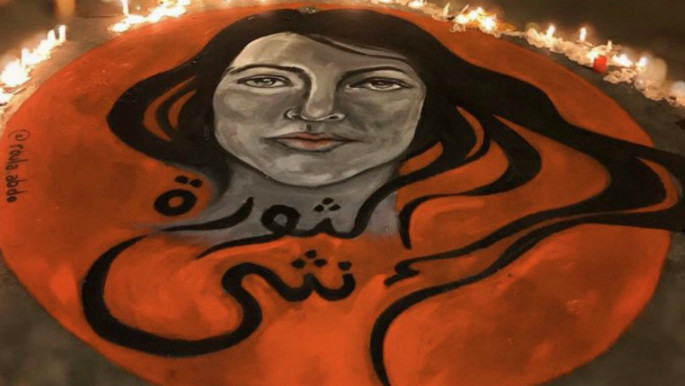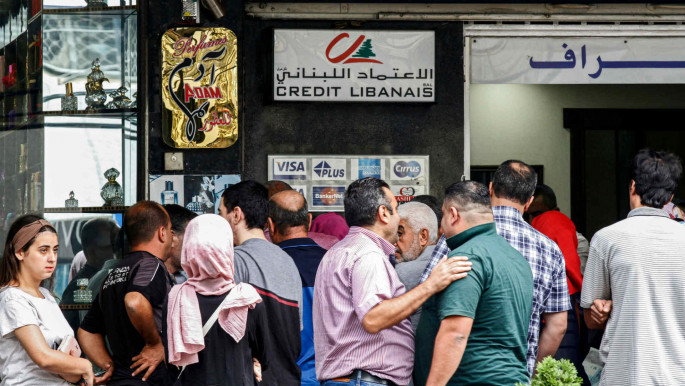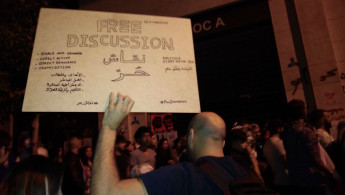Lebanon's revolution spawns 'direct democracy' with citizen assemblies and people's parliaments
Walking toward central Beirut's Riad al-Solh Square, crowds of protesters can be seen scattered along the main road, singing revolutionary songs and dancing, many are hanging out and talking, others are strolling around.
A handful of people are gathered on one side of the road. A man called Joseph is holding a sign above his head with the words "Free Discussions". He is engaging with people passing by who are keen on knowing more about the impromptu discussion corner.
The idea sprang up after Joseph, a Lebanese demonstrator like many others, had a few chats with some his work colleagues in the early days of the revolution. The initial point was to talk politics on the square, then the team took it to the streets. It was an improvised experiment to test.
"We agreed that popular revolts need public awareness and enthusiasm," Joseph explained.
"We decided to go to downtown Beirut, and to our surprise it worked out. Since then, we've kept going to the same area and speaking to random groups of protesters to suss out their motives and hopes."
Rachad Samaha, a social activist and core member of the free discussions group adds, "We were talking among ourselves about how we could be more involved in the revolution... not just by joining protests, but through helping to bring people together to discuss issues that we are all fighting against. We can then reach some common ground."
 |
Most people are pushing for a switch from a confessional to a civil state |  |
Centring such group discussions over the need to change the current political system, and put an end to sectarianism, and possible ways to fix the country's rapidly declining economy has been the leading drive for prompting exchanges of views between people from within the largest protest movement.
 |
|
| Read also: 'The revolution is female': Why feminist issues are driving Lebanon's protests |
The major matters of national concern voiced by citizens taking part in the talks include the accelerating economic crisis, the embezzlement of public funds, the decades-long ruling political elites who are being held responsible for the deepening crisis, and the confessional system, where power is divided among sects and has created patronage networks and clientelism at the detriment of the population.
Most people are pushing for a switch from a confessional to a civil state as demonstrators call for a technocratic government.
Lebanese blame the country's political elite for widespread corruption and nepotism, which they say contributed to Lebanon accumulating $86 billion of public debt, equivalent to 150 percent of the GDP.
Soon the conversations have increasingly incorporated issues related to real-time events and developments on the ground.
 |
Lebanese blame the country's political elite for widespread corruption and nepotism, which they say contributed to Lebanon accumulating $86 billion of public debt |  |
This includes demands set by demonstrators for each phase of the uprising (i.e. before and after resignation of the cabinet), how to organise a street movement while preserving its leaderless nature, how to plan necessary targeted actions directed at state institutions and road blockades.
One common point that participants have raised in the short term is the demand for a small interim government of independents (none of whom should be affiliated with any political party or religious sect) to guide Lebanon through the transition and planning of early parliamentary elections.
"The talks are not led by one side, each of the participants contributes with their knowledge or expertise," Samaha pointed out.
"Most of the time, we ask new people joining the group to pick a topic they are interested in, and they will open the debate."
The activist added that people engaging in discussions ultimately come to "commonly agreed solutions," a large part of which involves "drastic measures" aimed at tackling the country's economic emergency.
Some of these measures, he cited, have pointed to imposing capital controls on transfers overseas and applying haircut on large accounts, as well as introducing a more progressive tax targeting wealthy Lebanese directly, reclaiming public land and property, retrieving stolen money, and cutting ministers' and parliamentarians' salaries and bonuses.
"Our dialogue sessions are like a platform that connects people and triggers ideas," Joseph noted.
"After our initiative kicked off, many other groups started organising talks either independently, or through grassroots organisations or opposition parties."
Since the first week of the uprising, a multitude of spontaneous groups have surfaced launching open discussions all over Lebanon. They have put up tents in public squares around dozens of cities where people come and go debating a variety of ongoing and emerging issues.
The centre of the Lebanese capital is where street talks and discussions are being mostly held. The most central spot attended by revolutionaries is Beirut's Martyrs' Square – the focal point of over a month of nationwide rallies against corruption and sectarianism, which has been turned into a makeshift protest camp.
Facing Mohammad al-Amin mosque, a normally almost deserted car park that dominates the square is dotted with tents erected to accommodate a few dozen permanent protesters.
A black-and-white statue fist towering above the square with the word "Revolution" written on it can be easily spotted from afar.
Men, women and youngsters gathering and discussing their country's future makes a usual scene in downtown Beirut in the evenings. Some people discuss corruption, governance, civil society, and what the protest movement should do. Others attend debates on plans for political transition from the country's sectarian leadership. Many are eager to have a turn to vent their grievances.
 |
Their country has put up with 30 years of corrupt and sectarian rule since the 1975-90 civil war |  |
Few steps ahead from Martyrs' Square, more tents are set up in the Al-Azarieh parking lot, another key venue for talking events.
Sitting on a wheelchair in a small crowd of young women in a nearby tent is Lea Freiha, a chef activist. She broke her ankle while running on the third day of the uprising though that hasn't stopped her from joining the protests every day.
Currently, she is an active member of a women's discussion network organising regular meetings, and sharing information about day-to-day events and planned actions through a WhatsApp group.
 |
|
| Read also: Lebanon scrabbles to avert imminent economic collapse |
"It's a very organic group, we are people who don't know each other personally. We speak about ideas, come up with possible solutions and action points, aiming to see our demands met," Freiha tells The New Arab.
The topics discussed range from daily concerns for the general public, such as power outages, slow internet, unaffordable electricity and phone bills, expensive medical care and poor public infrastructure, to questions around how to move on and "win more battles" in the revolution.
"The purpose of having these conversations during the uprising is to attain some positive change for us Lebanese and for our country's future. We want to make Lebanon a better place to live," she continued. "This is make it or break it, and we have no other choice than to make it."
The new Lebanese generation, in particular, is well aware that their country has put up with 30 years of corrupt and sectarian rule since the 1975-90 civil war.
For the chef activist, the bottom line is to remove all the politicians from the old ruling guard or with links to the political establishment from power and to form a technocrat government of new, competent individuals instead.
So far, the street movement has forced the government's resignation. However, the next steps are unclear as Lebanese President Michel Aoun is still holding behind-the-door discussions with all parties trying to agree on the shape of the next government to tide things over until a future election.
Alessandra Bajec is a freelance journalist currently based in Tunis.
Follow her on Twitter: @AlessandraBajec



